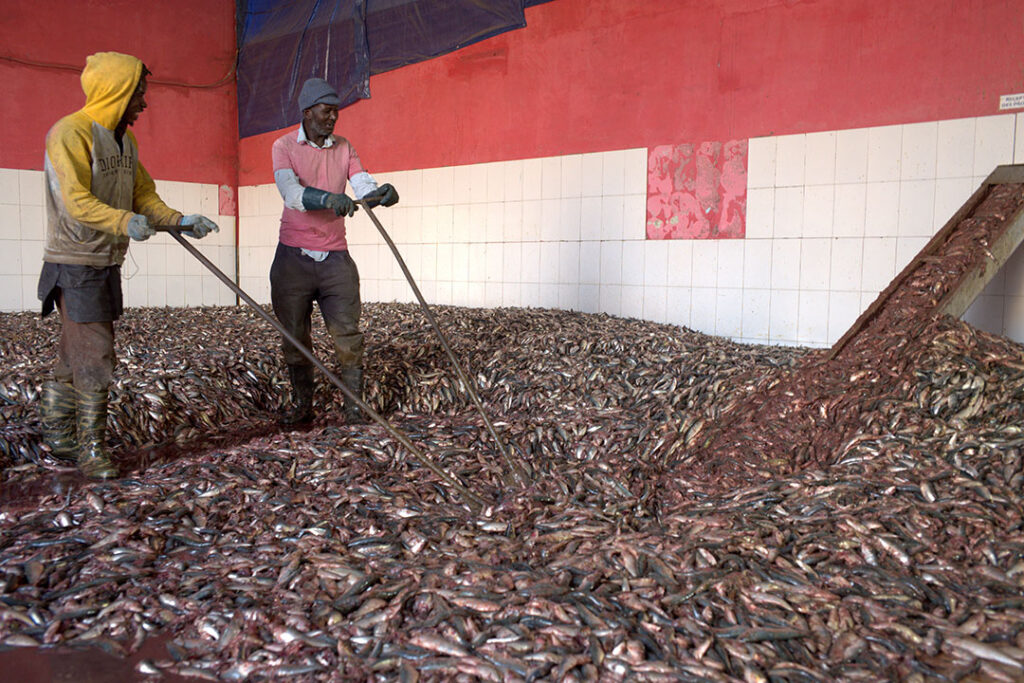Mauritania signed a 25-year fishing agreement with China in June 2010. After 15 years of overfishing by Beijing’s industrial trawlers, artisanal fishermen in Mauritania now struggle to fill their nets due to depleted fish stocks and the proliferation of factories making fishmeal and fish oil.
Ould Sidi, whose family has fished the waters for generations, said local fishermen once operated close to shore but are now forced to venture farther out to sea, making an already-dangerous occupation more perilous and expensive.
“I was born into a family where fishing is the only income-generating activity we practice,” Sidi, a pseudonym, told Global Voices. “This activity has always brought in money for our family. But since our authorities signed this agreement with the Chinese, everything has gone to hell. We can spend days at sea and come back empty-handed, because the Chinese have already been there with their fleets. Octopus and yellow mullet, two species we fish, have disappeared. It’s sad for our business.”
Ratified in 2011, the Poly Hong Dong Pelagic Fishery deal was controversial from the start, prompting furious fishermen to throw eggs at lawmakers who promoted it in Parliament. Under the agreement, the company was spared all import duties. A perceived lack of public accountability prompted opposition lawmakers to boycott the vote in Parliament.
Cheikhany Ould Amar was head of the Mauritania’s industrial fishing association in 2011 and worried that the deal did not offer enough protection of deep-sea fishing resources which at the time were already overexploited.
“The agreement gives no guarantee on controls,” Amar told Reuters.
Under the deal, Mauritanian authorities benefitted from a $100 million investment from China for the construction and operation of a wharf and fishmeal and fish oil factory in Nouadhibou, the country’s economic capital. Rich in protein, fishmeal is mainly used in fish farming and as feed.
“My neighbors come to me and complain because they haven’t caught anything,” Sheikh Muhammed Salim Biram told southworld.net. “But what can I do against the government? They brought the Chinese into the country. They steal our fish and make meals for their pigs while our people don’t have enough to eat.”
Fishmeal factories have historically been unpopular in West Africa. In The Gambia, for example, people protesting the environmental damage caused by the Chinese-owned Nessim Fishing and Fish Processing Co. set it on fire. Areas around these factories become so polluted that tourism grinds to a halt. Species that fuel the factories’ production already are overfished, driving food insecurity.
Fish in Mauritania traditionally were sold and consumed locally. Now, much of the fish caught off Mauritania’s coasts is processed in foreign-owned fishmeal factories, dozens of which operate in the country. In Nouadhibou, the country’s second-largest city, about 550,000 tons of fish are processed into fishmeal and fish oil each year.
“There are 30 fishmeal factories in the city and another ten in southern Mauritania,” Aziz Boughourbal, managing director of Mauritanian Holding Pelagic, told southworld.net. “It is evident that there are too many; our neighbor Morocco, which has a coastline twice as long as ours, only has ten.”
China’s involvement in the local fishing industry has created conditions that are unfavorable for local development, analysts Jean Sovon and Vivian Wu wrote for Global Voices. Besides decimating fish stocks, unchecked illegal, unreported and unregulated (IUU) fishing by Chinese trawlers threatens the livelihoods of about 300,000 people working directly or indirectly in Mauritanian fisheries. According to the IUU Fishing Risk Index, China is the world’s worst illegal fishing offender.
Mauritanian civil society organizations and international players such as Greenpeace Africa have called on the government to safeguard, maintain and conserve its natural resources and protect the livelihoods of its fishermen.
“As long as the Chinese are present in this sector, Mauritanian fishing is at a dead end,” a local fisherman told Global Voices. “And the consequences will be very serious for the whole country if nothing is done. Today, with this agreement signed with China, Mauritanian fishermen are largely excluded and marginalized. What will become of local fishermen once this agreement has come to an end? The authorities need to change course and consider our contribution to the country’s socio-economic development.”

